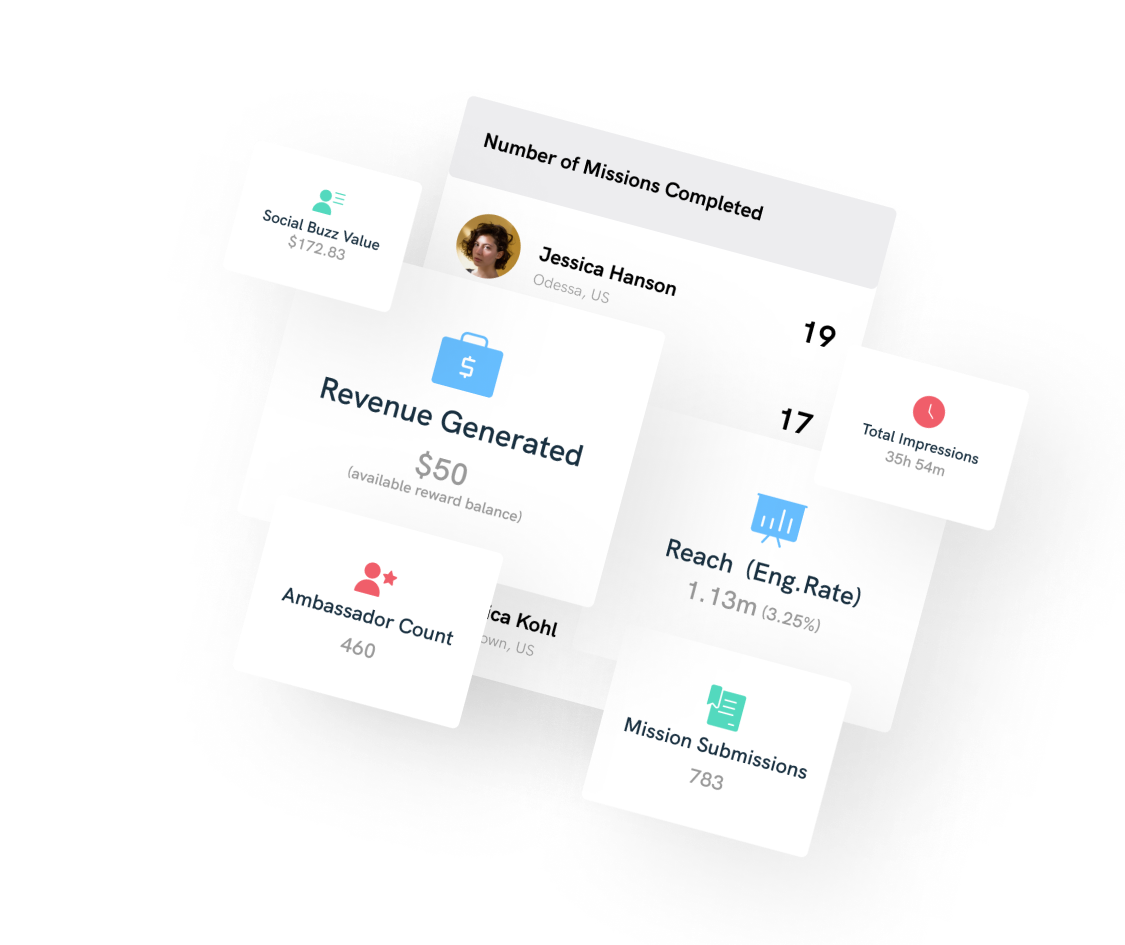Locking arms with social media influencers to advance your business can be one of the best decisions you’ve ever made … or the worst.
Like any marketing initiative, taking a look at the big picture by weighing the costs versus the benefits is crucial to making the right decision for your business.
That’s why we’re here to help.
Enter: social media influencers.
Take it from our experience at Brandbassador, social media influencers have a knack for curating targeted audiences, driving loyalty, and (most importantly) influencing sales. However, before diving in, it’s essential to weigh the influencer marketing pros and cons to ensure it aligns with your brand’s objectives.
Keep in mind that when you decide to start a new marketing strategy and include new resources such as influencers, you need to be clear about the goal you want to achieve.
The process of strategy development and communication plays a key role; for this reason, using a great board portal to make strategy sessions and meetings that bring concrete results to the teams involved is critical.
Having a well-planned influencer marketing project will save the company time and money by bringing visibility and traffic to the site.
If you’re ready to consider whether collaborating with social media influencers is right for your brand, take a look at the following pros and cons.
Pros and Cons of Working with Social Media Influencers
Pro: Growth hacking potential for established brands
Have you already created something special, but you’re ready to take it to the next level? Growth hacking your business via strategic growth marketing techniques could be just what you need.
But if you’re not experienced with growth hacking, you might invest too many resources into tactics that don’t drive the ROI you were hoping for.
Influencers, on the other hand, know how to drive fast growth for brands that are already on an upward trajectory.
Influencers can help brands grow quickly because they have a lot of followers who trust them. They're experts at creating visually appealing content and have a loyal audience that's interested in a specific topic, like fashion or fitness.
Plus, they know their audience like the back of their hand. So when an influencer promotes a brand or product, their followers are more likely to trust their recommendation and make a purchase.
The result? Access to your brand’s direct target market without sounding spammy or untrustworthy — increasing brand awareness in a positive light while simultaneously boosting sales.
Con: Growing too fast can be detrimental if you don’t have management and systems to support that growth
Growth hacking isn’t for the faint of heart.
Best case scenario? Your business skyrockets, and you quickly build new systems to support it.
Worst case scenario? You grow too fast and lack the proper management, systems, and structure to support and continue that growth.
For instance, if an influencer helps you get more eyes on your new line of leather jackets or your latest handmade eco-friendly bracelets, what’s going to happen if, consequently, you receive thousands of orders when you only have a limited supply of each item?
If you want to preserve your reputation and keep your new growth, you’ll need to have the right structure in place to support it.
Pro: Generating visibility and brand awareness for new brands
New to the game and need to get the word about your business? Influencers are pros at introducing audiences to new brands.
With nearly one and a half billion active users in the US on Instagram and nearly three billion on Facebook, it’s no wonder brands are getting serious about leveraging these platforms and increasing their Facebook and Instagram followers as strategically as possible.
LinkedIn, with its robust professional network and tools like LinkedIn Sales Navigator, further enhances a brand's ability to efficiently target and connect with potential clients, making it an invaluable asset in any marketing strategy.
Influencer marketing is one of the most effective methods for increasing brand exposure, authority, and advocacy among new audiences.
Here are some ways influencers can generate visibility for new businesses:
-
Running contests and giveaways
-
Hosting webinars, live videos, and workshops
-
Collaborating with other major influencers and ambassadors in your industry
-
Using and showcasing your products in their Stories, Reels, posts, and videos
-
Demonstrating how your products or services work and why they love using them
Con: Influencer fees may be out of budget.
Established influencers have a lot of clout and they’re not afraid to charge top dollar for it.
If you have flexibility in your budget, they can absolutely be worth their weight in gold. But if you’re on a limited budget, influencers with large followings may not be the best fit for your business.
Big brands might get a high ROI by hiring influencers with a massive audience, but this might not be true for local businesses, for instance, florists or coffee shops that serve niche audiences.
Enter: Micro-influencers and nano-influencers.
As the names suggest, micro-influencers and nano-influencers have smaller audiences within an ultra-specific niche. They tend to be more approachable and accessible than celebrities or mega-influencers.
As a small, new, or local business, influencers with tight-knit audiences can help generate a buzz around your brand without the steep costs.
Take BriteCo as an example, a business that specializes in providing jewellery and engagement ring insurance. BriteCo works with various micro-influencers with curated audiences that value fashion and style advice.
Here’s an example of one of those posts, a micro-influencer created after partnering with BriteCo to promote its layered necklaces:
Another alternative to hiring a mega-influencer is to find a freelancer that can help you leverage your social channels to grow your brand. You can leverage the right Upwork competitor platforms to find relevant freelancers for your needs.
While influencers can boost your brand's visibility and reputation, there are some downsides. Working with a freelancer may offer more flexibility regarding budget, content, and the ability to maintain complete control over your brand messaging.
Ultimately, deciding to hire an influencer or a freelancer will depend on your specific goals and resources. Be sure to clarify the terms of invoice payment before starting your collaboration.
Pro: Building trust with aligned audiences
Influencers are specialists in their fields, which is why their followers know, like, and trust them.
They've developed an uplifting and respectful relationship with their supporters by sponsoring products and services that work, solve problems, and align with their core values.
One of the main tools they use to build loyalty? Storytelling.
By delivering epic stories and sharing their own journeys, influencers develop deeper, more meaningful connections with their audiences.
Take the following example from dental service provider, Dentfix.
In this example, Dentfix partnered with actor and influencer, Sara Quiriconi in an effort to educate its audience on medical tourism and a viral phenomenon called Turkey teeth.
While Sara already had an established following and reputation, going the extra mile by shooting a video about her medical tourism journey helped her audience further crystallize what that experience could be like if they followed suit.
This not only helped alleviate barriers to entry for Dentfix prospects, but it also puts the purchasing power back in their hands, where it belonged.
Con: If the influencer’s reputation plummets, your brand name may also be affected.
Pay attention to who you associate yourself with, they say … and for good reason.
“Guilty by association” may feel unfair, but the reality is, who you do business with affects the way your audience perceives your brand. If they’re unhappy with a political viewpoint, messaging style, or brand position, they may unfollow the influencer and any businesses they support.
Think back to the drama that surrounded Chick-Fil-A and Nike when they fell in the middle of major political controversies. How many people stopped buying from these businesses after the drama began?
Influencers who continued supporting these brands put their reputations on the line.
Unfortunately, any additional brands these influencers promoted could’ve gotten dragged through the mud as soon as the influencers’ reputations took a dip.
Pro: They’re visual marketing gurus and epic content creators.
Content and visual marketing are captivating ways to attract audiences — if you know how to create value-driven campaigns.
Thankfully, with influencers, you don’t have to rely on Canva tutorials, free vector images, and social media templates to create visually appealing and valuable content.
When you hire an influencer, they take care of the content marketing for you.
Depending on which assets you hire them for, they can create professional photos (like the one above), Reels, gated downloads, Stories, carousels, and any other deliverables you agree on.
Con: Unless you create an approval process, influencers may post content that doesn’t align with your brand ethics, style guide, or identity.
Getting on the same page about visual and brand identity is key when working with influencers.
Otherwise, you may run into a sticky situation if an influencer posts content that doesn’t align (or worse, goes against) your ethics, style guide, or brand image.
Images deliver powerful messages. The right image can create an emotional connection, deliver value, and build trust. The wrong image, on the other hand, can strike concern, dismay, and distrust — all of which can harm your identity and reputation.
Pro-Tip: Review the influencer’s current and past social media content in-depth before deciding to work with them. If you’re unhappy with their messaging style, images, and core values, that’s a clear indication they’re not the right match for your brand. Look for influencers that post content that makes you feel as if it were designed with your business in mind.
Wrap up
There are pros and cons to getting social media influencers to endorse your brand.
Like any new initiative, it’s important to weigh the costs against the benefits, to decide if influencer marketing could be a wise choice for your specific business.
Thankfully, by educating yourself on what to stay away from and what to look for, you can minimize your chances of working with the wrong influencers and start building relationships with ambassadors that can advance your brand.
That’s it for now. Best of luck with your influencer marketing campaigns!









